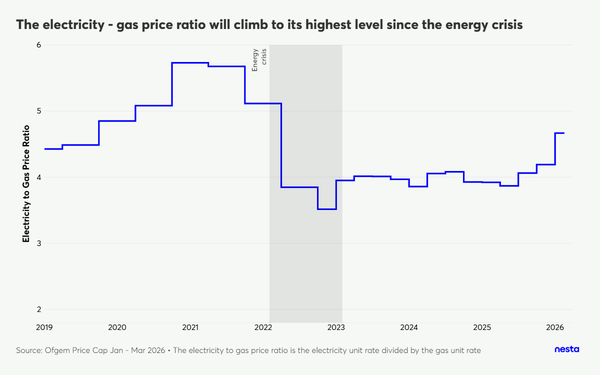London, UK – Sharp increases in electricity costs are set to push the electricity-to-gas price ratio to its highest level since the 2022 energy crisis, according to new analysis from the innovation foundation Nesta.
From January, a unit of electricity will cost 4.7 times more than a unit of gas under Ofgem's latest price cap. While gas prices are set to fall in January, electricity prices will rise sharply. This spike is primarily driven by the addition of the Nuclear Regulated Asset Base (RAB) charge and rising supplier operating costs being loaded onto electricity bills, even as the price of gas falls.
In January 2026, comparative electricity prices will be up 11% since the October to December 2025 price cap (from a ratio of 4.2 to 4.7) and 19% since the price cap of January to March 2025 (from a ratio of 3.9 to 4.7).
This will be the largest difference between the domestic prices for electricity and gas since March 2022.

Nesta is warning that this record electricity-to-gas price ratio - or ‘spark gap’ - will make it much harder to achieve the UK's mission to decarbonise home heating nationwide, which is essential for both energy security and climate goals. The Climate Change Committee projects that the UK needs to install 450,000 heat pumps per year by 2030, up from less than 100,000 now. Expensive electricity is the single biggest barrier to achieving this.
Ahead of the UK’s Budget, new polling also finds that the public are remarkably unified in their belief that the government should do more to reduce energy bills and fuel poverty. Conducted by More in Common for Nesta, the survey asked more than 2,000 adults in England, Scotland and Wales about their home energy costs and what the government should do to fix it.
The polling finds that 77% of the public believe the government is doing too little to reduce energy bills and 72% feel the same about tackling fuel poverty.
The government’s Warm Homes Plan, was due to be published in October, but is now expected in December. That plan aims to accelerate heat pump installations while lowering bills for fuel poor households. Higher electricity prices make that plan much harder to deliver, and risk leaving many households with higher bills.
The changes will particularly affect households using storage heaters, which are worst affected by fuel poverty. While a typical household with a gas boiler will see their annual bill increase by around £2.50 in January, a household with a storage heater will see a £100 bill rise.
Andrew Sissons, deputy director of sustainable future at Nesta, said:
“We're reaching a crunch point where runaway electricity prices are threatening to put the brakes on Britain's clean heat future. At 4.7 times the cost of gas, the comparatively high price of electricity has become a financial burden on households trying to go green, reflecting too many extra costs being loaded on to household bills.
“The public rightly want to see more action from the government to slash bills. To really make a difference, the government should use the upcoming Budget to cut electricity costs directly. Removing all taxes from electricity bills would reduce costs for a typical household by around £150, substantially reducing the price ratio and accelerating the transition to home heating powered by renewable electricity.”
Nesta recommends the government use the upcoming Budget to remove all taxes from electricity bills to reduce household costs and lower inflation by 0.3%.
Nesta’s analysis finds that from January, policy costs - which are effectively government taxes used to fund environmental and social schemes, such as subsidies for renewables - will make up about 18% of an electricity bill and 8% of a gas bill (up from 16% and 6% in the price cap from October to December 2025).
Notes to editors
About Nesta
Nesta is a research and innovation foundation that designs, tests and scales solutions for the biggest challenges of our time.
Driven by a vision to improve the lives of millions of people, our focus up to 2030 is on three missions: breaking the link between family background and life chances, halving obesity and cutting household carbon emissions.
We work with partners to develop high-potential solutions and test them as they evolve, drawing on expertise in qualitative and quantitative research, data science, behavioural science and design.
Once confident in the effectiveness of a solution, we take it to scale. We create national policy proposals, develop consumer-facing products and services, build and spin out commercial ventures and harness the power of the arts.
We work with two specialised units: BIT applies a deep understanding of human behaviour to help clients achieve their goals. Challenge Works designs and runs challenge prizes to spark innovation in science, technology and society. Find out more at nesta.org.uk